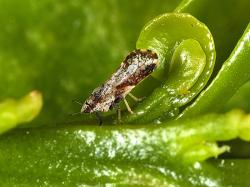Research Reveals A New Direction For Halting Citrus Greening Epidemic
March 27, 2018 | 1 min to read

ITHACA, NEW YORK —New clues to how the bacteria associated with citrus greening infect the only insect that carries them could lead to a way to block the microbes’ spread from tree to tree, according to a study in Infection and Immunity by Agricultural Research Service (ARS) and Boyce Thompson Institute (BTI) scientists.
Citrus greening, also known as “huanglongbing,” is a serious disease dramatically affecting citrus production across the world. Trees with this disease all die after only a few years. Citrus greening has been detected in every citrus-producing county in Florida, throughout the southern citrus growing states and in isolated spots in southern California. There is no effective prevention or cure.
The disease is associated with the bacterium Candidatus Liberibacter asiaticus, CLas for short, which is spread from tree to tree only by a tiny insect vector—the Asian citrus psyllid. If CLas cannot infect the psyllid, its ability to spread citrus greening is halted.
To read the rest of the story, please go to: USDA ARS
